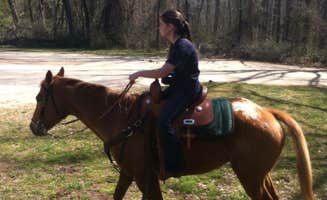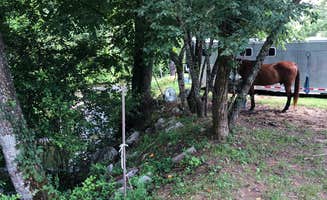Equestrian campgrounds near Anderson, South Carolina offer riders direct access to miles of forest trails through the Sumter and Chattahoochee National Forests. The region sits at elevations between 800-1,200 feet, creating moderate terrain suitable for both novice and experienced trail riders. Most horse camps in this area operate year-round with winterized facilities during colder months when temperatures can drop below freezing.
What to do
Trail riding along waterways: Willis Knob Horse Camp provides access to forest service trails following the Chattooga River. "Some of the best Horse Camping in the Mountains, Great Horse trails that follow the Chatooga River," reports Mark C. The camp includes sturdy highline posts for securing horses, though riders must bring their own ropes and gear.
Swimming and water recreation: South Cove County Park offers water activities beyond trail riding. "The lake is great for swimming. The campground also offers paddle board and kayak rentals," notes Amanda W. The park provides a designated swimming area with a sandy beach for campers wanting to cool off after a day on horseback.
Explore historic sites: Watson Mill Bridge State Park features Georgia's longest original covered bridge at 229 feet. "Park pass is $5 but the park is beautiful and a great way to spend the afternoon," says Kimberly S. The historic bridge and nearby trails make it an interesting day trip from horse camps in the region, with the park located approximately 45 miles from Anderson.
What campers like
Access to multiple trail systems: Whetstone Horse Camp connects directly to the Sumter National Forest trail network. "Trails were clean although a little too narrow in some spots, especially when needing to pass another horse and rider but there is plenty of wide open areas that allow for the perfect opportunity to stop and rest," shares Maddi P. The campground layout accommodates horse trailers with designated parking areas.
Water views from campsites: Campers appreciate waterfront access at several parks. At Lake Greenwood State Park, "lakefront sites are well worth the extra cost. Campsites are a bit tight, but the lakefront sites have great views," according to Megan M. These waterfront sites allow horses easy access to water while providing scenic camping locations.
Clean facilities: Randy's Horse Camp maintains well-kept grounds with essential amenities. "Wonderful place to Camp good people and beautiful views. And the creek runs thru the camp," reports Donna F. The campground's creek access provides natural water features for horses while maintaining clean facilities for riders.
What you should know
Reservation requirements: Most horse camps require advance booking, especially during peak seasons. At Oconee State Park, "we spent 2 nights in one of the cabins in this beautiful state park during a road trip through South Carolina. And let me say, 2 nights was not enough," mentions Jessica S. Reserve sites 3-6 months ahead for weekend stays during summer months.
Terrain considerations: Prepare for varied terrain when planning rides. "The sites are shaded, and flat with a gravel drive and tent pad," notes Lee D. about Watson Mill Bridge State Park. Trail difficulty ranges from moderate to challenging depending on the specific area and recent weather conditions.
Weather impacts: Monitor forecasts when planning equestrian camping trips. At Lazy J Campground, "getting back up if it had been raining would probably not be guaranteed, so watch the weather carefully. This site is best enjoyed in dry weather," warns Rebecca L. Spring and fall offer the most reliable conditions for trail riding.
Tips for camping with families
Kid-friendly amenities: Several campgrounds offer features specifically for children. At South Cove County Park, families appreciate that it's "perfect for kids, right on the lake. Loved the playground. Warning! Don't feed the geese! The campers next to us fed them and the next day we woke up with goose poop on everything! Including the picnic table," advises Roxy M.
Safety considerations: Families should prioritize campgrounds with controlled access. "The campground has a gate that gets locked at 10 pm. You can leave but you can't come back into the campground after the gate gets locked," explains Amanda W. about South Cove County Park, providing security for families with children and horses.
Educational opportunities: Incorporate learning experiences into equestrian camping trips. "I also highly recommend stopping by stump house tunnel which is near by [Whetstone Horse Camp] it's 2 adventures for the price of 1," suggests Maddi P. The tunnel provides historical context about the region while adding variety to horse-focused activities.
Tips from RVers
Site selection: Choose RV sites carefully at horse campgrounds. At Lake Greenwood State Park, "The RV sites don't really offer any trees for shade," notes Amanda W. Request sites with natural shade when available, especially during summer months when temperatures frequently exceed 85°F.
Hookup availability: Verify electrical capabilities before arrival. "Only 30 A power here so we had to watch what we were running electrically. They did have 2 30A outlets but at this time we did not have the double 30 to 50 amp adapter," reports Paul Z. about Watson Mill Bridge State Park. Bring appropriate adapters and power management equipment.
Leveling requirements: Prepare for site conditions requiring leveling equipment. "Campground terrain features level sites with room for multiple vehicles and trailers at each site," according to visitor reports. Most horse campgrounds prioritize level parking areas to accommodate larger rigs with horse trailers, though specific sites may require minor adjustments.



